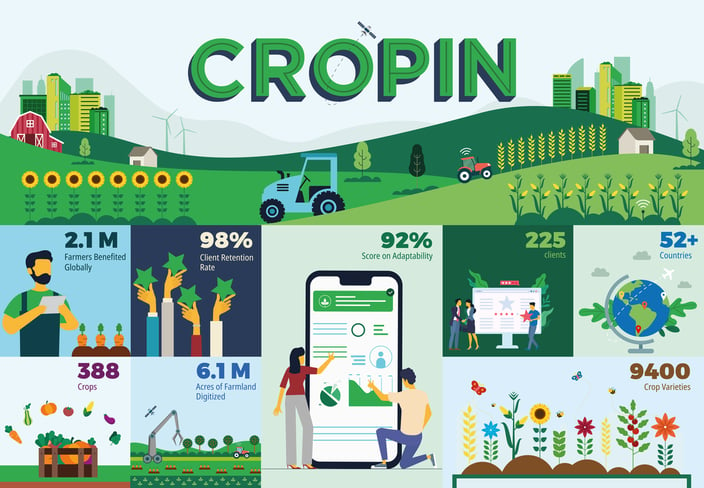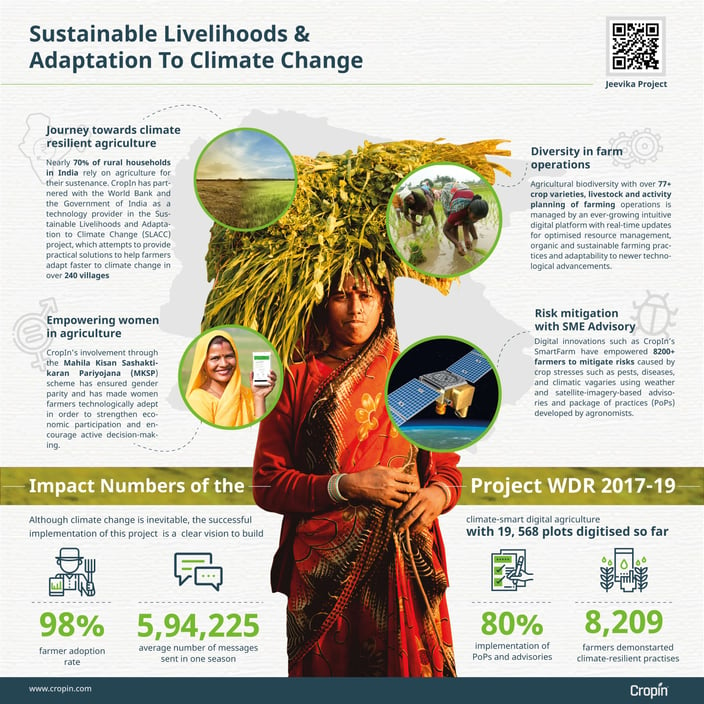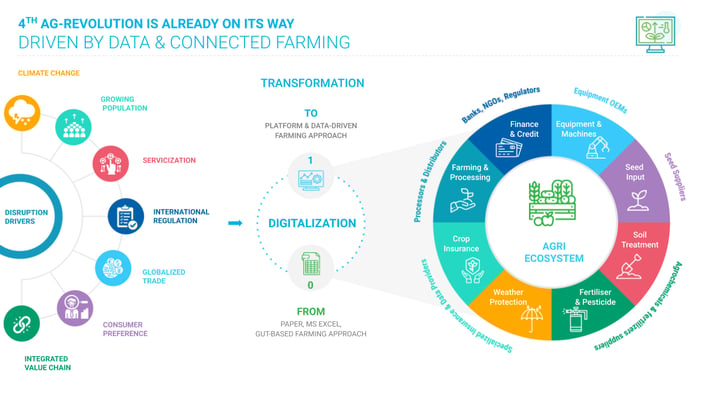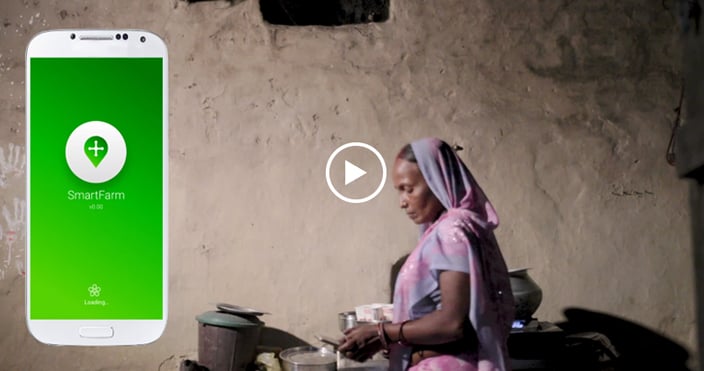Listen here:
How To Build A Resilient Agricultural Practice?
“I walk through three farm plots of my fellow farmers every day to examine the crop growth and occurrences of pest attacks or crop failure. I send photo alerts via my smartphone to Cropin, which sends an advisory within a few minutes to remedy the problem”, said Pratima Devi, a climate smart village resource professional in Manichak village in the Barachatti block of Gaya district in Bihar, India.
With the advent of the Green revolution, there has been intensive use of agricultural technology. Efficient farms and the adoption of traditional best farming practices, have raised the bar and propelled the growth of agriculture in India. However, agriculture today faces the new challenges of climate change, exploding population, water scarcity, and lack of traceability. There then arises a need for agri-innovation, which can be used for uniform and instantaneous dissemination of knowledge and integration of all stakeholders and processes to ensure better monitoring and traceability.
Big data can be leveraged in a multitude of ways including the formulation of robust and scalable policies, processes and systems, the ease and convenience of real-time governance, monitoring, controlling, and optimization.
We at Cropin aspire to create a digital ecosystem that provides services to all the farmers and constituents of the agriculture sector. Covering the entire agricultural life cycle we aim to aid and support the goal of doubling farmers' income and enhancing the GDP of the agriculture sector by providing new impetus in the pursuit of Sustainable Development Goals. With a commitment to quality, we also pay special focus on engineering a watertight value chain to ensure the highest product quality, transparency, and convenience of monitoring for optimal efficiency.
Cropin’s solutions are being used and trusted by a number of clients globally. With a score of 92% on adaptability and a 98% client retention rate, our solution has helped mitigate risk, increase income, and foster a symbiotic and sustainable relationship between the farmer and the environment.

How Cropin Impacted Asian Smallholder Farmers
“Large-scale pilots are being digitized in four districts of Bihar and Madhya Pradesh to test the effectiveness of digital apps to generate climate-resilient solutions. There is a demand and need to develop resilience in agriculture, to safeguard against regular weather shocks in the short-term and catastrophic climate change in the long. The global climate crisis is one of the biggest challenges facing Indian farmers today,” said a World Bank expert.
In less than a month, Pratima Devi completes a visit to all the farm plots in her village that are registered to get agro-advisories. “Women farmers appreciate my efforts and have started trusting my advice because they see a positive difference on their farms,” she adds.
Challenges Faced by the Smallholder Farmers
Many farmers in rural India lack the means to comply with metrics mandated by the sector. As a result, they either obtain a poor yield output or are unable to sell their produce due to not meeting the minimum required standards. This coupled with an erratic climate threatens millions of smallholder farmers in the Indian States of Bihar and Madhya Pradesh. There then arises a need to leverage digital technology to empower farmers to obtain better results, enable them to climb out of poverty, and maintain a sustainable livelihood for the years to come.
So What’s The Solution?
Sustainable Livelihoods and Adaptation to Climate Change (SLACC) Project associated with the Government of India’s National Rural Livelihoods Project (NRLP) is an initiative made possible through a public-private partnership between the State Rural Livelihood Missions in Bihar and Madhya Pradesh with Cropin Technology.
Our pioneering digital tools are being utilized as a part of both SLACC and NRLP, which are supported by the World Bank. Funded by the Special Climate Change Fund under the Global Environment Facility (GEF), the SLACC project aims to empower at least 10,000 farmers to adopt climate-resilient practices.
To effectively track and monitor farmer progress, there needs to be a foolproof mechanism that alerts and informs stakeholders at every level of the agri-ecosystem. Cropin’s SmartFarm is a state-of-the-art farm management solution that enables farmers to capture several parameters through every stage of production and monitor them systematically to increase productivity at every stage of production.

Increase efficiency and strengthen sustainability by obtaining periodic and valuable insights on crop health, pest infestation, crop growth, and output predictability with our cutting-edge algorithms. Establish a data-driven practice to make the best possible decision and procure only the highest quality crop.
Cropin has successfully digitized over 6.1 million acres of farms and can detect and monitor over 388 crops and 9400 crop varieties. Our solutions are location-agnostic and have been used in over 52 countries across diverse terrains and geographies. With a client retention rate of 98%, Cropin has met and exceeded the expectations of 225 clients around the world.
90,000 farm plots in SLACC areas in both states were audited and tracked across the Kharif and Rabi seasons for the major crops. Overall, NRLP was implemented in 13 states of India and has reached 7 million households.
Over 500 community professionals and other functionaries have been systematically trained by Cropin on farmer data digitization, crop advisories, timely activity updates, weather advisories, farm area auditing, geo-tagging, and crop health monitoring. These community professionals will serve as change agents to scale up the digital interventions in Bihar and Madhya Pradesh, and possibly to other states under the NRLP.
Cropin Technology has developed a climate-smart advisory module that develops season-wise crop configurations for all the major crops and provides a weather-based advisory to SLACC farmers in the local Hindi language on predictive and curative measures promoting sustainable agriculture practices.
Tracking farming activities has never been easier. With better end-to-end visibility and an easy-to-use mobile application, farm extension workers can maintain better efficiency and transparency and alert stakeholders in the case of pest infestation or disease.
Web- and mobile-based advisory dashboards have been developed to enable the Village Resource Professionals to get important insights around sowing, soil health, seed treatment, recommendations for harvesting fertilizer, and seven-day weather forecasts derived from the best available weather observation systems and forecast models. This data is then downscaled at the farm plot level to help smallholder farmers make effective decisions for their crops. The module also considers technical inputs in real-time from agriculture experts in state research institutions and farm alerts from village resource professionals to develop these practical agri-advisories.

Cropin's digital applications advise farmers on ways to achieve optimal harvests, depending on weather conditions, soil and other indicators. Earlier, farmers relied on traditional wisdom alone but now digital information can help them make faster and better decisions on the times of sowing and harvesting.
After using CropIn's platform, a village resource professional was able to raise a number of alerts in Bihar and received many advisories from Cropin on sowing, soil health, seed treatment, and weather forecasts that benefited farmers. Over time, he developed skills to interpret technical advisories, train farmers to apply information on their fields, and interact with Cropin professionals, which earned him the status of a master trainer.







